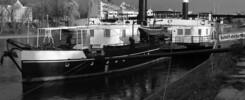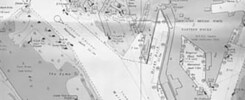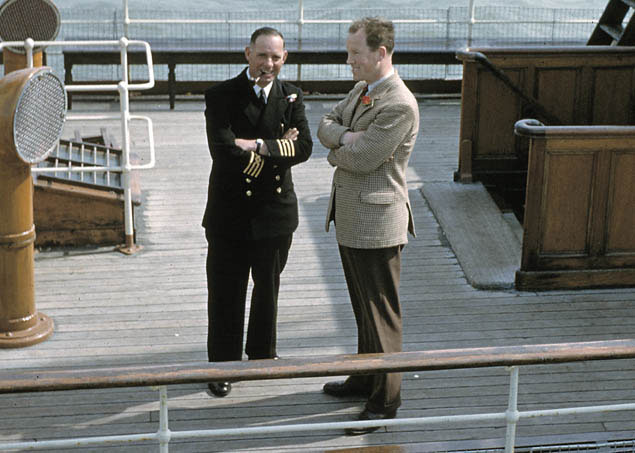
Many will remember Capt Leonard Horsham pictured here with John Richardson aboard his beloved paddle steamer Medway Queen, of which he was master for her whole post war career.
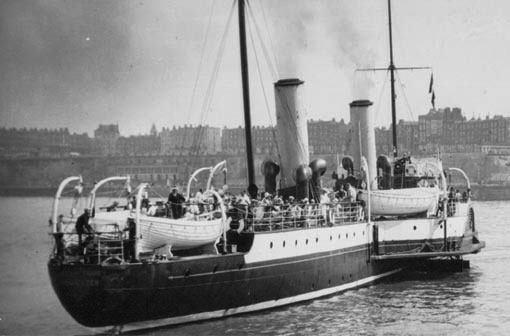
In the early 1930s, soon after he had joined the New Medway Steam Packet Company, Leonard Horsham was Chief Officer of the Queen of Thanet (pictured above off Margate). She had been built in the First World War as a minesweeper and was one of two such ships bought by the company and converted for passenger use. From the start of their services in 1929 the Queen of Thanet and the Queen of Kent proved to be very useful additions to the fleet with their good passenger capacity and the revenue earned by them on their cross channel trips from Chatham, Southend and Margate to Calais, Boulogne or Dunkirk, paved the way for financing the first of the large motor ships, the Queen of the Channel, in 1935.
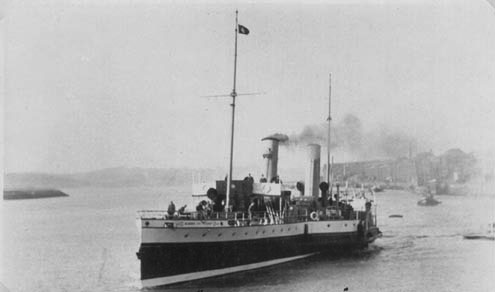
Queen of Thanet approaching Chatham Sun Pier in the 1930s. Kingwear Castle’s current home at Thunderbolt Pier at the Historic Dockyard Chatham is just beyond the Queen of Thanet’s aft funnel.
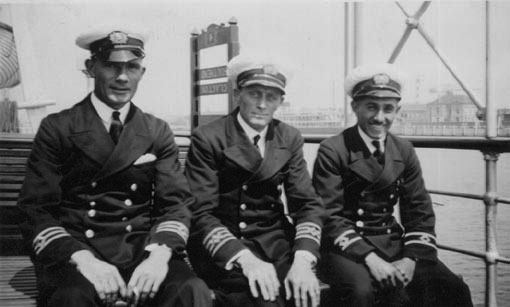
Leonard Horsham (above left) moved as chief officer with Capt Tommy Aldis (above centre) as master to the new Diesel passenger ship Queen of the Channel in 1935 and then in 1937 to the new Royal Sovereign on which the above picture was taken at Ostend. Does anyone out there know the identity of the second mate (above right)?
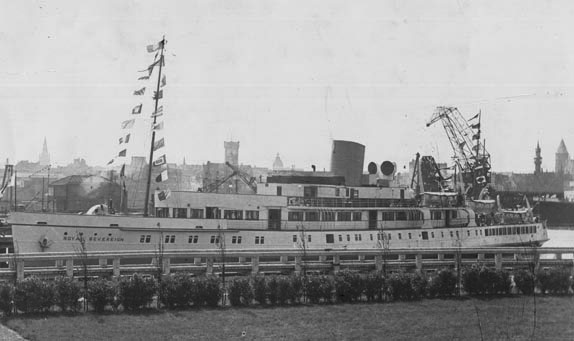
The Royal Sovereign (pictured at Ostend) was a substantial ship, 277ft long, with a gross tonnage of 1,527 tons and capacity for 1,600 passengers. Sadly she was lost in the Second World War but was replaced by an even larger Royal Sovereign in 1948.
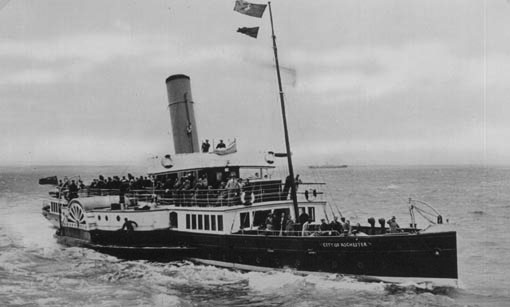
Later in 1937, in the same year that the New Medway Steam Packet Company was taken over by the General Steam Navigation Company, Capt Horsham was given his first command, the paddle steamer City of Rochester (pictured above) which was then based at Ipswich operating on the Harwich, Felixstowe, Walton and Clacton service. In the August 1967 edition of Paddle Wheels, the then secretary of the London Branch of the PSPS, Collard Stone, recalled:
The last occasion Capt Horsham took her down the Orwell on Sunday August 27 1939 was an historic one. When City of Rochester left Ipswich on that day on her usual summer service she had more passengers aboard than usual for it was obvious that war was imminent and many came because they feared that it might be the last of such trips that they would enjoy. This was indeed the case for on the next day the City of Rochester was recalled to her base in the Medway.
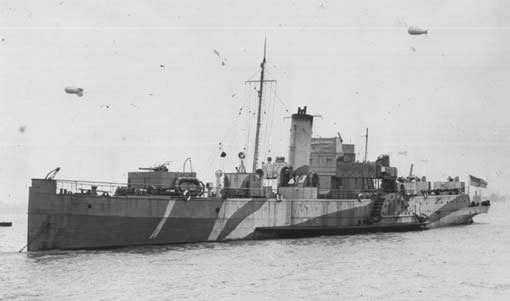
After the outbreak of war the Thames Queen (pictured above), which had started life as the Yarmouth Belle, one of the famous “Belle” steamers, was fitted out as an anti-aircraft ship and Capt Horsham took command of her and remained with her until the end of hostilities.
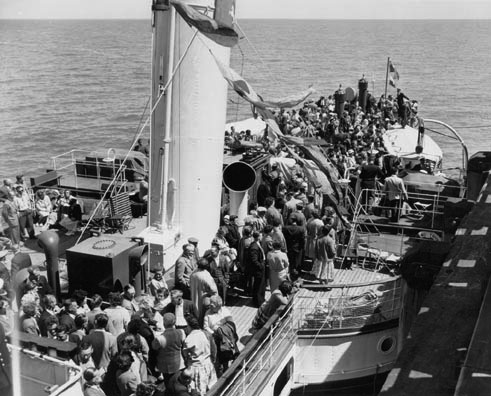
After the war, Capt Horsham joined the Medway Queen, on which he became a permanent and much respected fixture on her sailings from her base at Strood. It was most unusual for Medway Queen to sail seawards of the Board of Trade Partially Smooth Water summer limits to the east of a line drawn between Clacton and Reculver but occasionally she did. The above picture was taken on a rare charter to Margate and gives a glimpse (bottom left) of the peak of Capt Horsham’s cap and a few of the buttons on his uniform jacket.
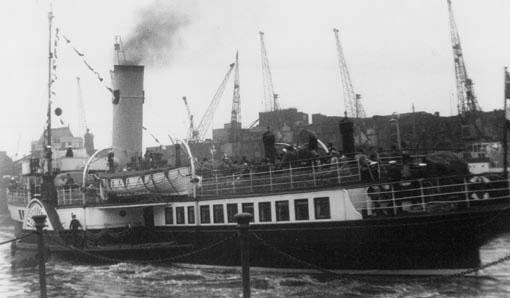
On several occasions Capt Horsham took Medway Queen to London for charters (pictured above leaving Tower Pier) the first being for a day trip to Clacton in June 1955 for Don Rose, a man who subsequently gained fame with his acquisition of the Clyde paddler Jeanie Deans which he ran as the Queen of the South in 1966 and 1967 on the Thames with spectacular lack of success. Long standing PSPS member John Richardson recalls:
We all thought it was the first time Medway Queen had ventured to the Pool. The nearest she got to in the Thames was possibly Gravesend or Tilbury. After that she became better known as the last paddle steamer on the Thames and did one or two more charters from the Tower. I remember Len asking me if I would like to come with them to Strood after they finished and I enjoyed a lovely moonlit night on the bridge with him. Left Tower Pier about 9pm and reached Strood about 1 to 1.30am.
Don Rose maintained that his charter was a factor in the company adding Clacton to Medway Queen’s schedule. Certainly the charter showed that she could do it and keep to time but other factors will also have been considered. The relaxation of the no-passport regulations meant that the large Diesel passenger vessel Queen of the Channel could more profitably be based on the Thanet and Essex Coasts for cross channel trips rather than coming down from London and Southend to Clacton most days on a route where she was potentially splitting the available business with her quasi-sisters Royal Sovereign on her run from Tower Pier and Southend and Margate and Royal Daffodil running from Gravesend to France. The small Rochester Queen, which had run regularly between Strood, Southend and Herne Bay since the war was sold for service in Germany in 1956 and renamed Hein Muck (She later appeared in Guernsey as the Commodore Queen running to Sark.) The small Diesel Crested Eagle, which had appeared on various short runs including London dock cruises and trips from Ramsgate and which had latterly filled in on the Clacton run from Southend, was chartered to Campbell’s for service on the Sussex Coast in 1957, never to return to operation on the Thames. So from around 1957, under the command of Capt Horsham, Medway Queen’s services were expanded from her more usual diet of Strood, Southend and Herne Bay to include Clacton and an afternoon River Blackwater cruise two days a week.
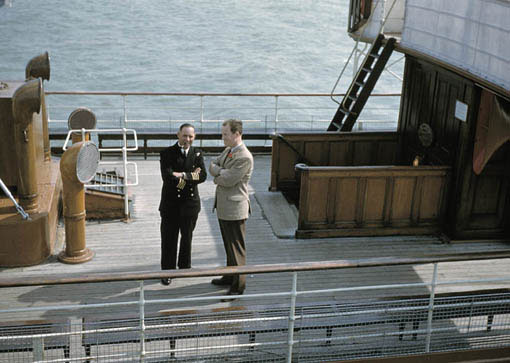
Capt Horsham pictured on the Medway Queen at Clacton in the late 1950s talking to John Richardson. John recalls:
I may have been telling him about the shipping forecast which he had probably asked me to listen to on his radio in his cabin. At that time it was broadcast at 1.55pm and that was just the time Medway Queen was arriving at Clacton. The only way he could hear the forecast was on his own radio. There was no other radio on board or radar for that matter.
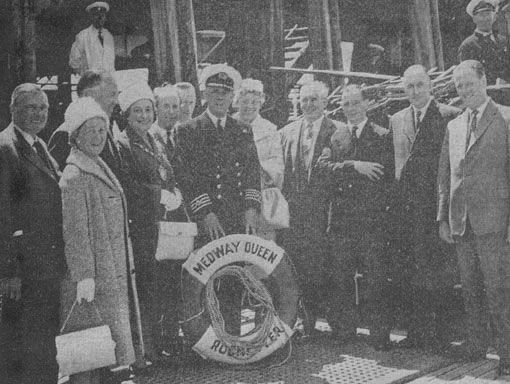
1963 was Medway Queen’s last season in service and the picture above, with Capt Horsham at the centre, was taken aboard her alongside Herne Bay Pier on her last visit to the resort in early September of that year. It is a sobering thought that Medway Queen managed only seventeen seasons on the Medway and the Thames in the post war period and Kingswear Castle has already clocked up twenty years of service for and from the Medway Towns since 1985.
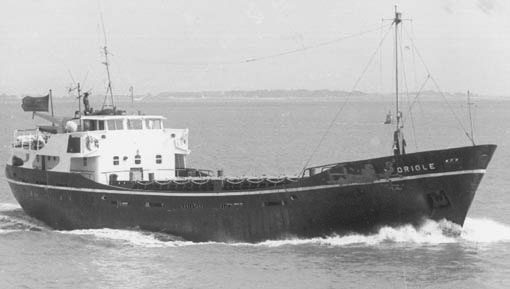
As the GSN owned a fleet of small and some larger cargo ships, it was the norm for the passenger steamer masters to go to sea in the winter and Capt Horsham served as captain of many of the company’s coasters over the years including the Greenfinch, Kingfisher, Oriole, Ortolan, Petrel, Plover and Stork. It must have been hard for him though in the summer of 1964, the first after the withdrawal of the Medway Queen, to find himself stuck in the sleek modern wheelhouse of the almost brand new Oriole (pictured above) often sailing between Goole and Boulogne, a run which John Richardson recalls that he was “not very keen on as he was closer to his Rochester home in Boulogne than in Goole!” He would much have preferred to have been out on his open paddle steamer bridge amongst friends of many years standing, calling at the usual and much loved piers on the Thames and Medway with the added benefit of a return to Strood Pier every night and a short walk home.
Captain Horsham occasionally appeared in later years for one-off trips as the Medway pilot on the larger GSN Diesel passenger vessels but otherwise he continued on the cargo ships until the spring of 1969 when he was taken ill aboard the Petrel, a slightly larger but similar vessel to the Oriole. Detained in hospital, initially in Hull, his legs became paralysed and he died on 14th May 1969 in hospital in Woolwich.
In his Paddle Wheels article Collard Stone continued:
Captain Horsham was a good master and due to his friendly disposition obtained the best from his crew, the result of which was his ship’s immaculate condition. Duty was his first concern. Whilst the ship was in motion he seldom spoke but was only too happy to converse with passengers when lying at a berth.
He was survived by his wife and two daughters.
Kingswear Castle returned to service in 2023 after the first part of a major rebuild which is designed to set her up for the next 25 years running on the River Dart. The Paddle Steamer Kingswear Castle Trust is now fund raising for the second phase of the rebuild. You can read more about the rebuilds and how you can help if you can here.
John Megoran

